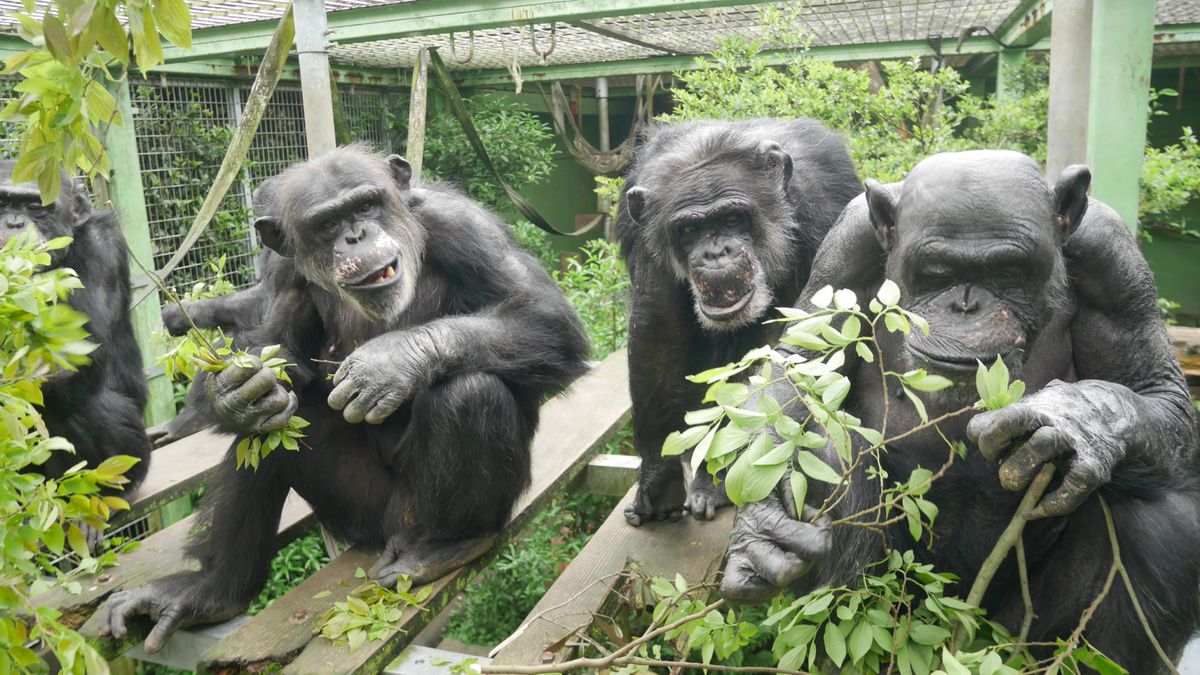Chimpanzees tend to pee when others in their group do, in a phenomenon scientists have dubbed “contagious urination.”
Because groups of people often go to the bathroom together too, and chimpanzees are our’ closest living relatives, this social behavior could be traced back to our common ancestor, researchers said.
“In humans, we know that our decision to urinate is influenced by social contexts that lead us to urinate simultaneously with others, and that this simultaneous urination could also promote further social bonding,” study co-author Shinya Yamamoto, a wildlife researcher at Kyoto University, told Live Science in an email. “Our study with chimpanzees clearly shows that they share some similarities in this phenomenon, suggesting the deep evolutionary origin of contagious urination.”
The team decided to study the behavior after noticing that a group of chimpanzees at a zoo tended to urinate at about the same time, and wondered whether it could be similar to contagious yawning, which has been observed in other primates and wolves.
Related: Humans’ big brains may not be the reason for difficult childbirth, chimp study suggests
For the study, published Monday (Jan. 20) in the journal Current Biology, researchers observed 20 chimpanzees in captivity at the Kumamoto Sanctuary in Japan for more than 600 hours.
They found that when one chimpanzee in the group peed, others were more likely to follow. The researchers recorded the number of urinations that occurred within 60 seconds of one another, and then compared these data with randomized computer simulations. The study found that this contagious urination behavior increased with physical proximity, so chimpanzees seeing another chimpanzee close to them peeing were more likely to follow suit.
Social rank also influenced this behavior: Chimpanzees with lower dominance ranks were more likely to pee when others were peeing. Social closeness, measured by time in close proximity and grooming with another chimpanzee, had no effect on the peeing phenomenon — unlike with social yawning, which increases in socially closer pairs.
Contagious urination could be important to social group cohesion, coordination or reinforcing social bonds, the researchers said.
The behavior could exist to encourage “state-matching,” where chimpanzees improve group cohesion by all being in a similar state, study co-author Ena Onishi, a wildlife researcher at Kyoto University, told Live Science in an email. The behavior could also reinforce social connections.
Another possibility is that multiple chimpanzees urinating in a single location can deter or confuse predators, by reducing the risk of being tracked through scattered urine odors.
While no similar studies have yet been conducted on chimpanzees in the wild, some researchers have noted similar behaviors in wild populations, Onishi said. The researchers are also curious about whether other species show this contagious urination behavior.
“We are greatly influenced by the presence of others, even in mundane activities,” Onishi said. “For example, in both chimpanzees and humans, behaviors like yawning, walking, rhythmic tapping, and even pupil size are known to be contagious.”
Studying contagious urination could help scientists understand the behavior of humans’ common ancestors with chimpanzees, and the origin of the social custom in humans, Onishi said.”
